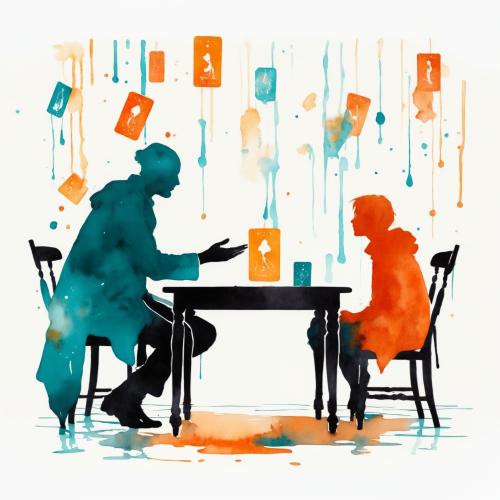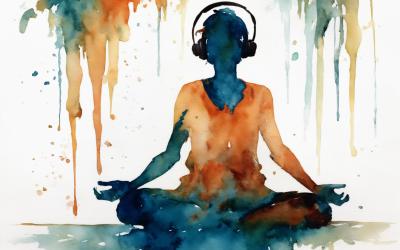Someone’s probably told you you’re reading tarot wrong at some point: whether it’s about reversals, deck cleansing rituals, or which spread to use, unsolicited advice seems to come with the territory. Let’s talk about maintaining confidence in your practice while handling criticism with grace.
The Advice Brigade
"You must sleep with your deck under your pillow." "Never let anyone else touch your cards." "If you don't use reversals, you're missing half the meaning." Sound familiar? The world of tarot comes with more rules than a Victorian etiquette manual, and just like those antiquated guidelines about which fork to use for fish, not all of them serve a practical purpose.
These well-meaning suggestions often come from experienced readers who learned tarot in a particular tradition. They're passing on what worked for them, but somewhere along the way, "this worked for me" transformed into "this is the only way."
Understanding the Interference
The need to control how others practice tarot runs deeper than simple disagreement about technique or tradition. It's rooted in complex psychological patterns that tell us as much about the critic as the criticism itself.
The Psychology of Control
Our relationship with spiritual practices often intertwines deeply with our sense of self. When someone practices differently than we do, it can feel like a personal challenge to our identity. It's rather like watching someone eat pizza with a knife and fork when you've spent years perfecting your fold-and-bite technique - the difference shouldn't matter, but somehow it gets under your skin.
This discomfort often manifests as an overwhelming urge to correct, guide, or control others' practices. The more invested someone is in their particular method, the more threatening alternative approaches can seem. It's a defensive reaction that says, "If they're right, what does that make me?"
Spiritual gatekeeping - that peculiar phenomenon where practitioners appoint themselves as bouncers of the metaphysical nightclub - stems from similar insecurities. By controlling who gets to practice and how, gatekeepers create an illusion of authority in a field that's inherently personal and subjective.
Social and Cultural Factors
The rise of social media has amplified these controlling tendencies. What once might have been a quiet disagreement between readers now becomes a public performance of righteousness. As I explored in my article on the enshittification of spiritual practice, the commercialization of tarot has created additional pressure to appear authoritative and "authentic."
These factors combine to create what I call the "tarot superiority complex" - a curious condition where one's perceived expertise becomes a barrier to continued learning. The more someone invests in being "right," the harder it becomes to remain open to alternative perspectives.
Religious Opposition and Societal Judgment
When I first started reading tarot, I kept my cards hidden away like a teenager's secret diary. Not because I believed I was doing anything wrong, but because I'd internalised society's judgment about tarot readers. Would my friends see me differently if they knew I read cards? Would colleagues question my professional judgment?
This internal conflict wasn't unique to me - many readers initially struggle with how to present their practice to the world. It's a bit like being a vegetarian at a traditional family roast dinner; you know the questions and judgment are coming, you're just not sure how to handle them yet.
Common Criticisms
Religious objections to tarot often stem from misunderstandings about its nature and purpose. Some view it as fortune-telling or attempting to usurp divine will. Others associate it with negative stereotypes perpetuated by media portrayals - the mysterious woman in flowing robes, predicting doom by candlelight.
These misconceptions create real challenges. Family members might express concern about your spiritual wellbeing. Colleagues might question your judgment. Some clients might hesitate to work with you professionally if they discover you read tarot.
Understanding Opposition
The fear of tarot often reflects deeper anxieties about control and uncertainty. When someone condemns tarot reading, they're frequently expressing discomfort with the idea that meaning and guidance might come from sources outside their established worldview. This reaction stems from a complex web of cultural, religious, and personal experiences that shape how people view practices they don't understand.
Religious opposition, in particular, often comes from a place of genuine concern. Many religious traditions emphasize specific channels for divine guidance, viewing anything outside these channels as potentially dangerous or misleading. It's rather like having a trusted family doctor - when someone suggests trying acupuncture, the initial reaction might be skepticism or worry, not because acupuncture is harmful, but because it falls outside one's established framework for healing.
The historical context of this opposition runs deep. During periods of religious upheaval and reformation, many spiritual practices were labeled as suspicious or dangerous, not necessarily because they were harmful, but because they represented a threat to established power structures. These historical attitudes continue to influence modern perspectives, often unconsciously. Even in our supposedly secular age, these centuries-old prejudices surface in subtle ways - in raised eyebrows at business meetings, in well-meaning concerns from family members, in casual jokes that carry an edge of judgment.
Media representation hasn't helped. Films and television typically portray tarot readers as either fraudulent charlatans or mystical beings with supernatural powers. Reality, as usual, is far more nuanced - we're simply people using cards as tools for reflection and insight. This gap between portrayal and reality creates a feedback loop: people form opinions based on media stereotypes, those stereotypes influence how tarot is represented, and the cycle continues.
When faced with religious opposition specifically, it's helpful to understand that different belief systems often share common ground in their search for meaning and guidance. The tools may differ, but the human desire to understand our lives and find direction remains constant. This understanding can open doors for respectful dialogue, even when complete agreement isn't possible.
The key lies in finding ways to discuss your practice that acknowledge others' concerns while maintaining your own boundaries. You might explain how tarot serves as a tool for reflection, similar to how religious texts offer parables and stories for contemplation. Or how the symbolism in tarot cards, like religious art and imagery, provides a language for exploring human experiences and challenges.
Facing the Devil (Literally)
Perhaps the most common religious objection to tarot is the belief that it's inherently demonic or evil. This perspective is particularly ironic given that the Rider-Waite-Smith deck, arguably the most popular tarot deck worldwide, is steeped in Christian imagery. Angels grace multiple cards, biblical scenes appear throughout, and even The Devil card itself serves as a warning about materialism and earthly attachments rather than promoting anything nefarious.
This fear of tarot as demonic often stems from a misunderstanding of its history. The cards began as a simple playing card game in Renaissance Italy - hardly the stuff of dark rituals. The Christian imagery was deliberately incorporated by Arthur Edward Waite, a Christian mystic himself, who designed the deck to reflect spiritual truths through symbolism.
When someone claims "tarot is the devil," they're often expressing a learned fear rather than a reasoned position. This fear typically comes from teachings that lump together anything outside mainstream religious practice as potentially dangerous. It's a perspective that leaves little room for nuance or historical context.
Responding to such claims requires patience and understanding. While it might be tempting to argue or defend your practice, remember that fear-based beliefs rarely yield to logical arguments alone. Instead, consider responses that acknowledge their concern while providing context:
"I understand why you might feel that way. Did you know that the deck I use was actually designed by a Christian mystic and is full of biblical imagery? I use it as a tool for reflection, much like how others might use parables or psalms to find guidance."
Of course, there will be times when no amount of historical context or explanation will bridge the gap. In these cases, it's perfectly acceptable to simply acknowledge the difference in perspectives and maintain appropriate boundaries. Not everyone needs to understand or approve of your practice for it to be meaningful and valuable to you.
Moving Forward with Confidence
Criticism of your tarot practice, whether from religious objectors or self-appointed tarot police, ultimately presents an opportunity for self-reflection. Not because the critics are right, but because our responses reveal much about our relationship with the cards.
Strengthening Your Foundation
The best defence against both dogmatic readers and religious criticism is a clear understanding of your own practice. This means:
- Knowing why you read the way you do
- Understanding the history and context of your methods
- Being clear about your boundaries and ethics
- Having confidence in your approach while remaining open to growth
Building Professional Resilience
For professional readers, managing criticism becomes part of business practice. Consider:
- Clear communication about your methods on your website or marketing materials
- Professional language that emphasises tarot as a tool for insight rather than prophecy
- Boundaries around what services you provide and don't provide
- A prepared response to common concerns or criticisms
Creating Supportive Communities
While not everyone will understand or accept your practice, you don't have to navigate these challenges alone. Finding or building communities that support diverse approaches to tarot can provide:
- Space to discuss experiences without judgment
- Opportunities to learn from different perspectives
- Support when facing criticism or doubt
- Resources for continuing development
The Path Forward
Perhaps the most powerful response to those who would dictate your practice is simply to continue reading with integrity and authenticity. After all, tarot itself teaches us about the importance of finding our own path - just look at The Fool, stepping confidently forward despite warnings from their small companion.
Your practice will evolve as you do. Some critics' suggestions might eventually prove useful, while others will remain irrelevant to your journey. The key is maintaining the confidence to discern which is which.
Remember that your relationship with tarot is precisely that - yours. Whether you read with reversals or without, cleanse your deck under every full moon or never at all, use complex spreads or simple ones, the only real measure of success is whether your practice serves its purpose for you and, if you read for others, your clients.
In the end, the biggest gift we can offer the tarot community isn't conformity to any particular method, but the authentic expression of our unique perspective. After all, tarot's rich history is one of evolution and adaptation. Today's rigid rules were yesterday's innovations - and tomorrow's practice will be shaped by those willing to trust their own path.






